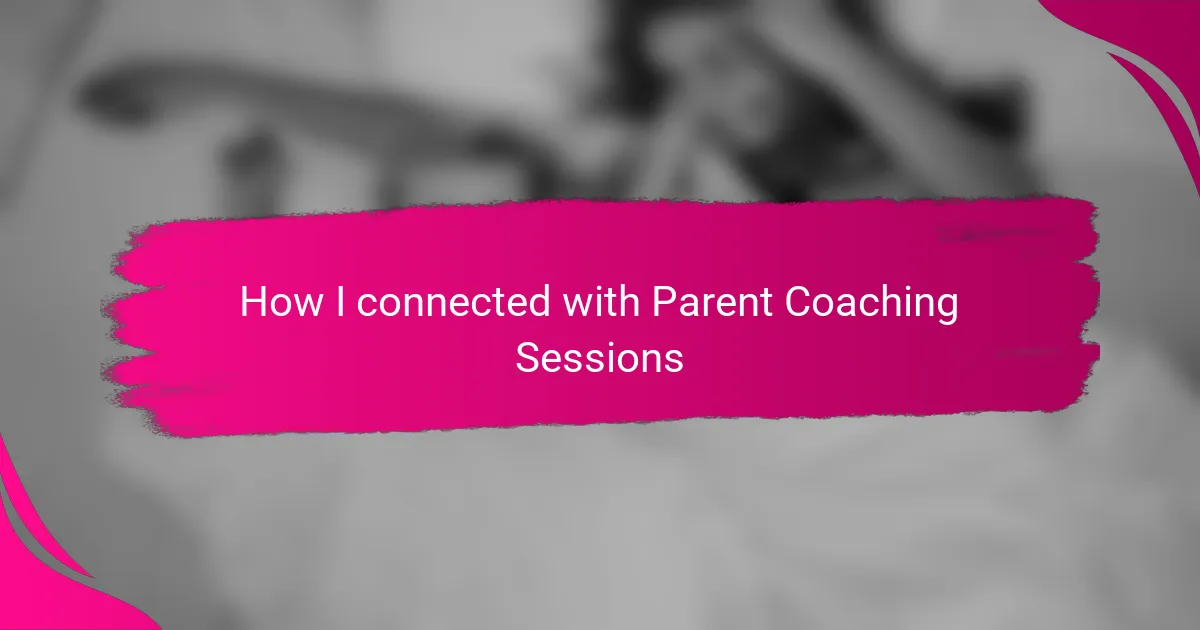Key takeaways
- Parent coaching sessions provide a supportive environment for parents to explore their challenges and develop practical strategies.
- Choosing the right coaching program involves finding a coach who listens and offers personalized support tailored to individual parenting styles.
- Preparation for coaching sessions includes identifying specific challenges and creating a distraction-free space to foster open communication.
- Measuring progress is about recognizing subtle emotional shifts and maintaining self-compassion, rather than just focusing on achieving specific goals.
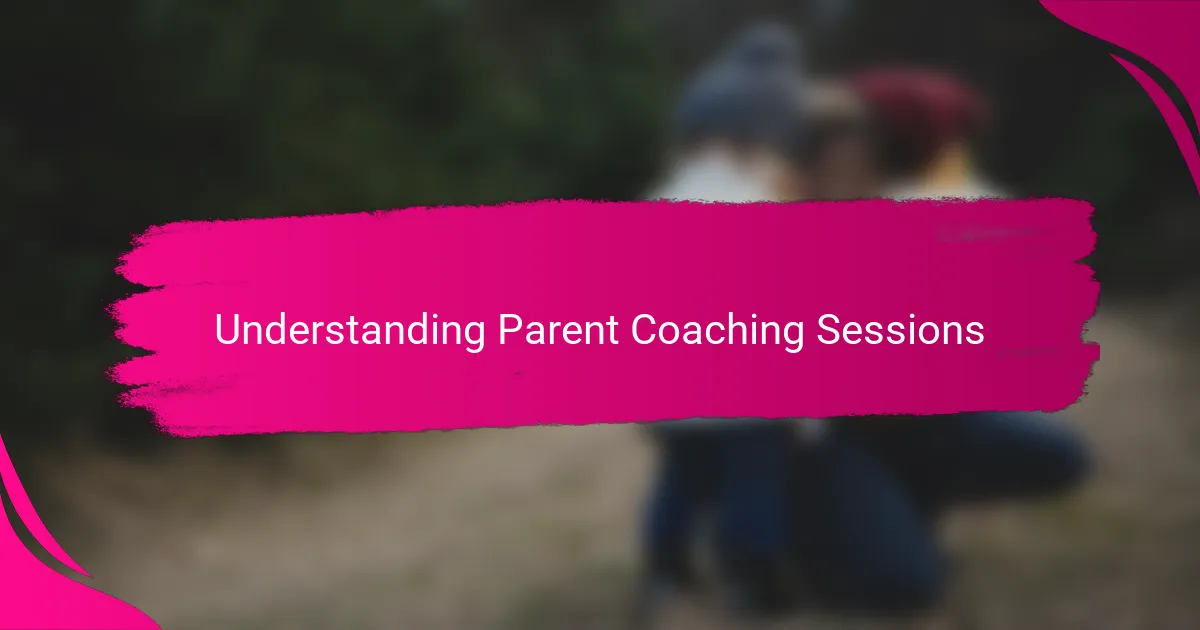
Understanding Parent Coaching Sessions
Parent coaching sessions, to me, have always felt like a conversation with a wise friend who listens without judgment. Have you ever wished for a space where your parenting challenges are truly heard and understood? That’s exactly what these sessions offer—a chance to reflect, learn, and grow alongside someone who supports your unique journey.
I remember my first session vividly; I was nervous but quickly realized it wasn’t about doing everything perfectly. Instead, it was about exploring practical strategies and uncovering the reasons behind my child’s behavior. This approach helped me feel less overwhelmed and more empowered, which made a huge difference.
What struck me the most is how parent coaching doesn’t just focus on the child—it acknowledges the parent’s feelings and experiences too. It’s a two-way street, where your emotions and insights are just as important, making the process feel truly collaborative and personal.
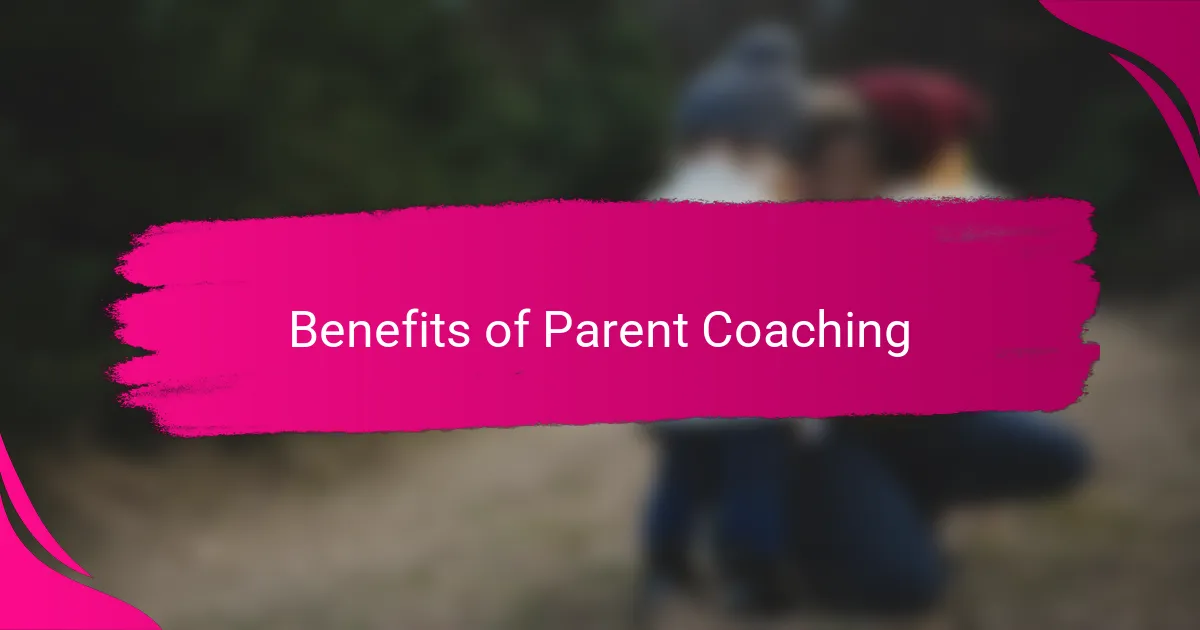
Benefits of Parent Coaching
One of the biggest benefits I found in parent coaching was the boost in confidence it gave me. Have you ever doubted your instincts as a parent? Through these sessions, I learned to trust myself more, realizing that I already had many of the answers within me—I just needed a little guidance to bring them out.
What really surprised me was how these conversations helped reduce the daily stress of parenting. Instead of feeling alone in the chaos, I gained practical tools that made overwhelming moments manageable. It’s like having a personalized toolkit for those tough days that every parent faces.
And perhaps most importantly, parent coaching reminded me that taking care of my own emotional well-being is essential. When I started valuing my feelings and needs, I found I could show up more fully for my child. Isn’t that what we all want—to be the best version of ourselves for our kids?
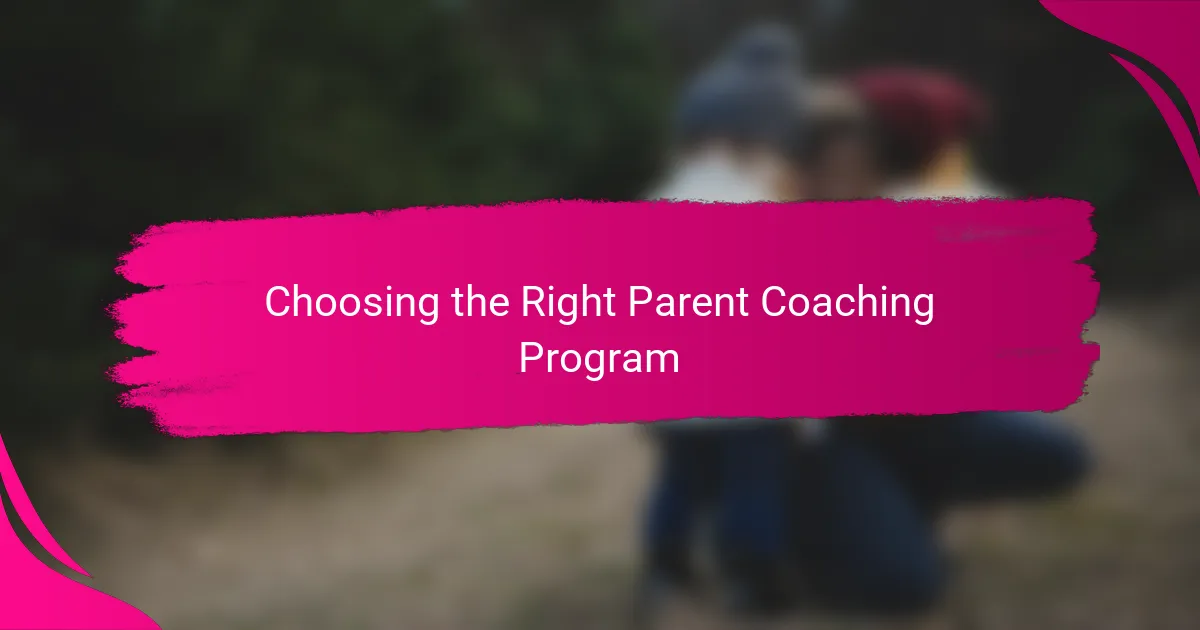
Choosing the Right Parent Coaching Program
Choosing the right parent coaching program felt like a crucial first step for me, and I quickly learned that not all programs are created equal. Have you ever felt overwhelmed by the sheer number of options and unsure which one truly aligns with your parenting style and values? For me, it was about finding a coach who genuinely listened and adapted their approach rather than offering one-size-fits-all advice.
I also realized the importance of a program that balances practical strategies with emotional support. Some programs focus heavily on techniques, but I needed one that recognized the ups and downs of my own feelings as a parent. That kind of empathetic approach made me feel safe to open up and explore deeper challenges without fear of judgment.
What helped me decide finally was checking out reviews and asking other parents about their experiences. Hearing honest stories made the choice clearer and gave me confidence that the program I picked would actually support my growth—not just teach me “rules” to follow. Have you found that peer insights often give you a better sense of what to expect? I certainly did.
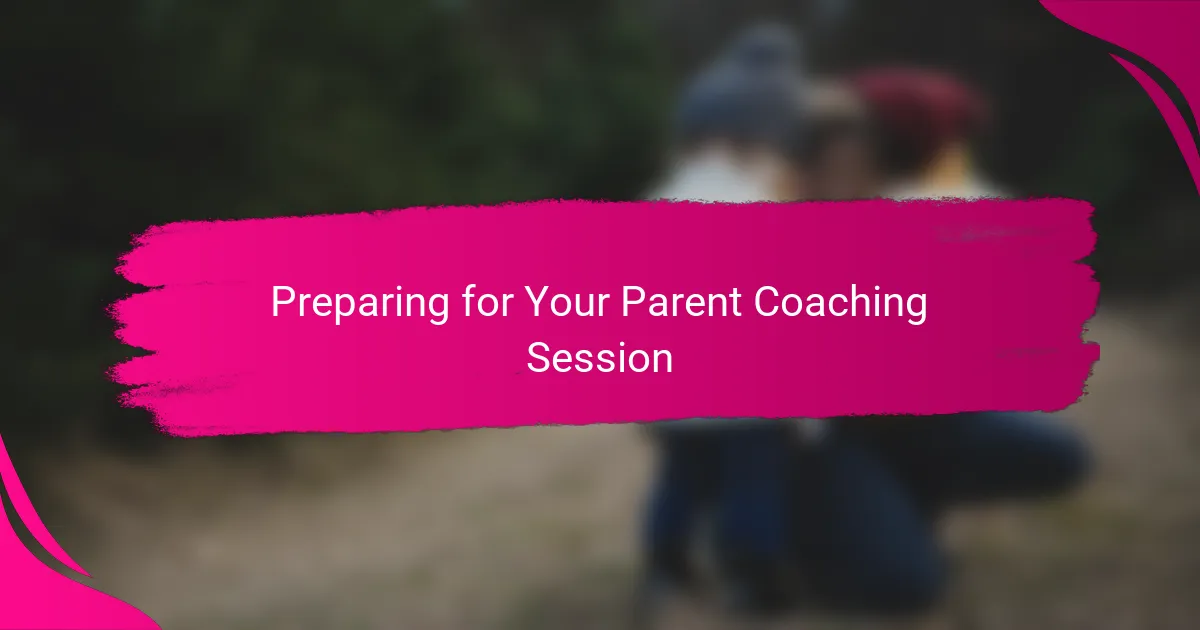
Preparing for Your Parent Coaching Session
Getting ready for your parent coaching session felt a bit like preparing for an important conversation with someone who truly cares. I found it helpful to jot down specific challenges or questions beforehand—this way, I didn’t leave the session wondering what I forgot to mention. Have you ever walked out of a meeting thinking, “I wish I had said that”? Writing things down saved me from that feeling.
Another thing I discovered was the importance of creating a quiet, comfortable space for the session. Since these conversations often touch on emotions and tricky moments, having a distraction-free environment made it easier to focus and be honest. I remember closing the door, silencing my phone, and feeling more present than I had in a long time.
Lastly, I asked myself: Am I ready to be open and patient with myself during this process? Parent coaching isn’t about quick fixes; it’s about gentle progress. Bringing an open heart—and a willingness to try new ideas—turned out to be the best preparation I could give myself. Have you noticed how mindset shapes the whole experience? I certainly have.
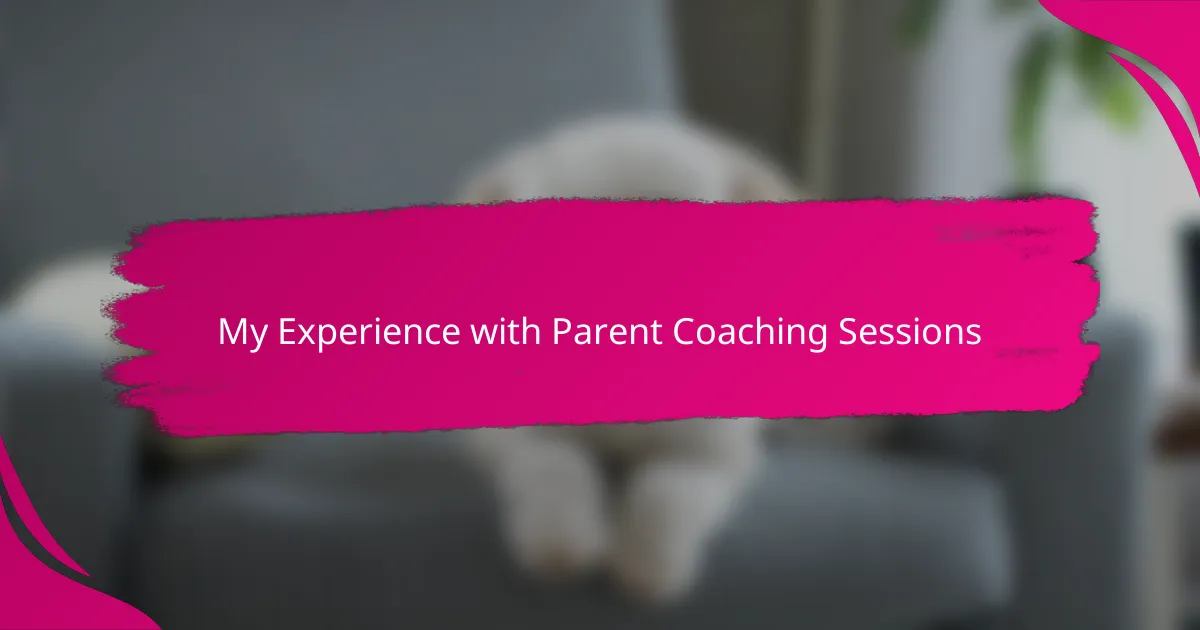
My Experience with Parent Coaching Sessions
I still remember the mix of relief and curiosity I felt after my very first parent coaching session. It was like a weight lifted off my shoulders because I wasn’t alone anymore—someone was there to help me navigate the daily ups and downs with understanding and practical advice. Have you ever experienced that moment when someone truly “gets” what you’re going through?
What surprised me most was how each session peeled back layers I hadn’t even realized were affecting my parenting. I found myself opening up about frustrations and hopes I usually kept buried, and that honesty made the progress feel real and meaningful. It’s funny how sharing your story can become one of the most powerful steps toward change.
Sometimes, I left sessions feeling energized and hopeful, ready to try new strategies with my child. Other times, I just appreciated having a safe space to acknowledge that parenting isn’t perfect, and that’s okay. Did you know that accepting imperfection can actually be one of the greatest lessons parent coaching offers? For me, it was a game changer.
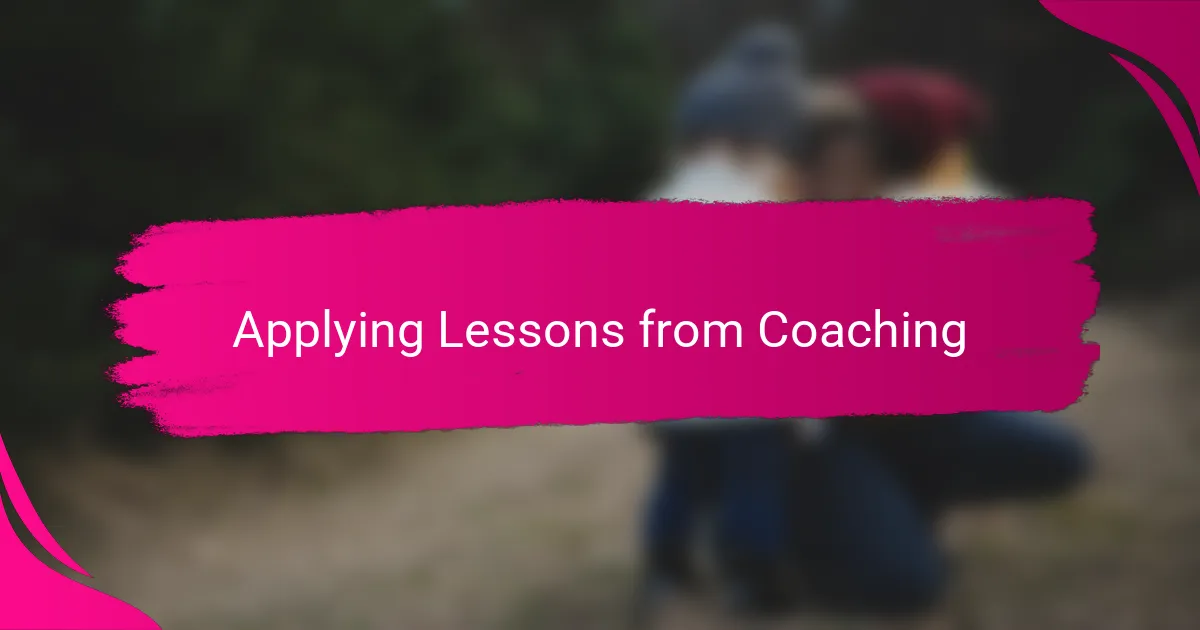
Applying Lessons from Coaching
Applying what I learned from coaching sessions wasn’t always easy, but small changes made a big difference. For instance, I started pausing before reacting to my child’s outbursts—a simple step that helped me respond more calmly and thoughtfully. Have you ever noticed how just a brief moment of reflection can shift the whole dynamic at home? It certainly did for me.
Another lesson that stuck with me was the importance of consistency in routines and boundaries. At first, it felt tough to maintain these without feeling rigid, but the coaching helped me see flexibility as part of firmness. That balance reduced tension and helped my child feel more secure, which was a win for both of us.
I also found myself valuing those moments of self-reflection after each coaching session. Asking myself, “What worked today? What didn’t?” turned daily parenting from a series of reactions into conscious growth. Looking back, it’s clear that applying these insights didn’t just change my parenting—it reshaped how I saw myself in this role.
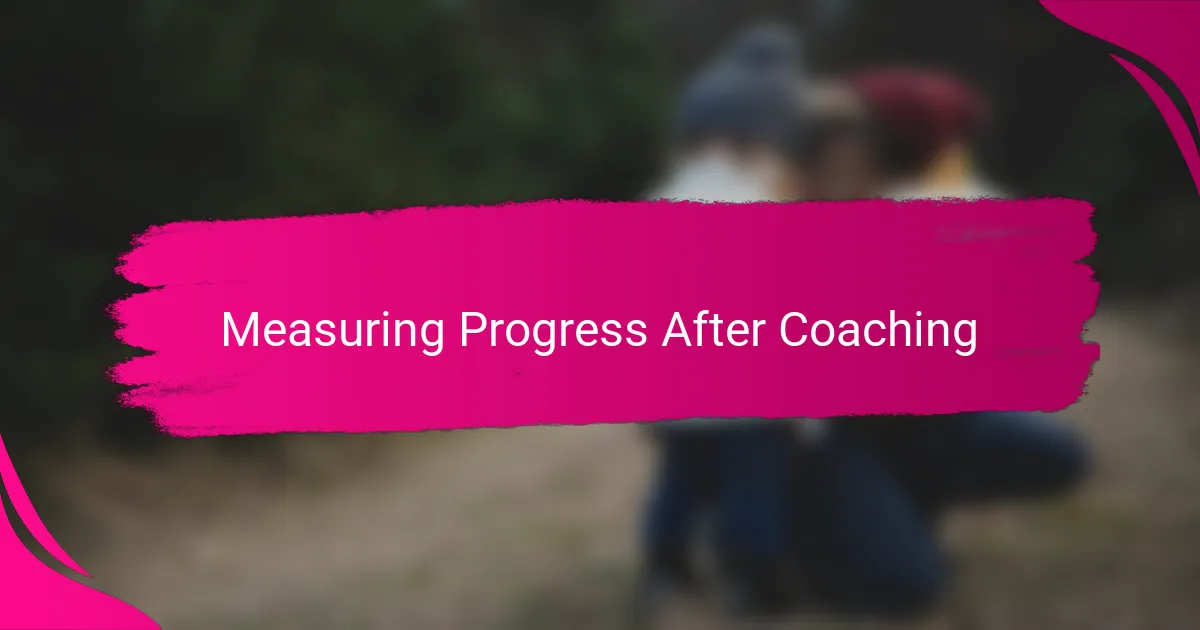
Measuring Progress After Coaching
Measuring progress after coaching felt like trying to capture something that’s both visible and intangible at the same time. I asked myself, “How do I really know if I’m improving?” For me, it wasn’t just about checking off goals but noticing subtle shifts—like feeling a little more patient during tough moments or recognizing when I could apply a strategy without thinking twice.
Sometimes I tracked progress by reflecting on my own emotions at the end of the day. Did I feel calmer or more confident? Those quiet moments of self-assessment became a way to see growth that numbers or charts couldn’t show. Have you ever felt proud of a tiny victory that others might overlook? That’s exactly how I measured some of my biggest wins.
I also realized that progress isn’t always linear. Some days I took two steps forward and one step back—and that’s okay. What mattered was staying committed and compassionate toward myself. Looking back, those inconsistencies actually highlighted how deeply I was changing, bit by bit.
